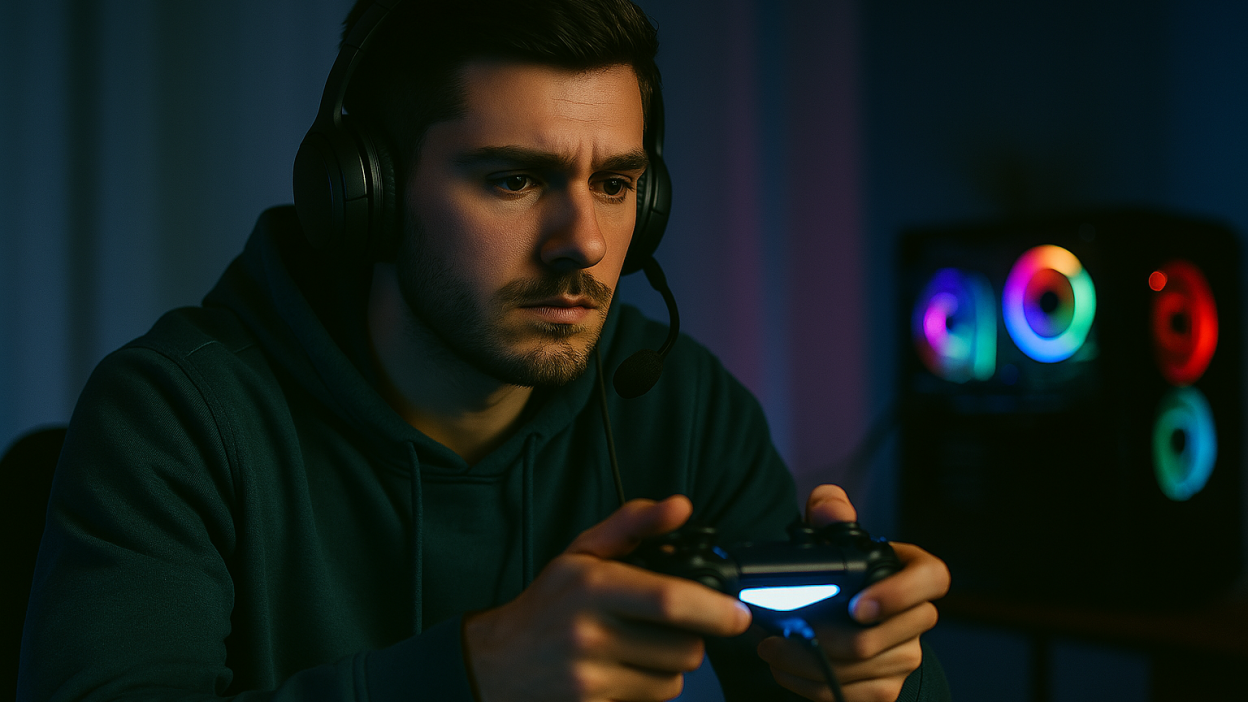Gaming has evolved from a casual hobby into a global phenomenon, with over 3 billion players worldwide. Whether you’re playing casually on your phone or grinding through competitive matches in eSports arenas, games can significantly impact your mental health—for better or worse. Let’s explore the good, the bad, and the addictive sides of gaming in relation to mental well-being.
✅ The Good: How Gaming Can Improve Mental Health
1. Stress Relief and Emotional Regulation
Games can offer an immersive escape from real-world stressors. Engaging in gameplay releases dopamine—a neurotransmitter linked to pleasure and motivation—which helps reduce anxiety and uplift mood. For many, gaming acts as a safe emotional outlet.
2. Cognitive and Problem-Solving Benefits
Strategy games like Civilization or StarCraft, and puzzle-based titles like Portal or The Witness, challenge players to think critically, plan ahead, and make quick decisions—skills that can translate into real-life problem-solving.
3. Social Connection and Community
Multiplayer games provide opportunities for social interaction, especially important in an increasingly digital and isolated world. Games like Minecraft, Fortnite, or Final Fantasy XIV foster friendships and even communities that can be incredibly supportive.
4. Therapeutic Uses
Serious games and VR experiences are being developed for therapeutic purposes, including PTSD treatment, anxiety management, and even cognitive behavioral therapy. Titles like Sea of Solitude and Celeste also address mental health themes directly, encouraging empathy and understanding.
⚠️ The Bad: When Gaming Harms Mental Well-Being
1. Sleep Disruption
Late-night gaming sessions can interfere with natural sleep cycles, leading to fatigue, irritability, and worsened focus. Blue light exposure from screens suppresses melatonin production, making it harder to fall asleep.
2. Increased Anxiety and Toxicity
Fast-paced competitive games can increase anxiety levels, especially when players are subjected to verbal abuse or cyberbullying. Toxic gaming environments, unfortunately common in some communities, can lead to a decline in mental well-being.
3. Neglect of Real-Life Responsibilities
When gaming becomes a priority over education, work, or relationships, it can harm a person’s personal growth and social life. Skipping meals, assignments, or work shifts in favor of gaming is a sign of imbalance.
4. Emotional Dependency
Some players use gaming as a way to escape deeper emotional issues like depression, trauma, or social anxiety. While gaming might mask the symptoms temporarily, it does not address the root cause and may delay seeking professional help.
🚨 The Addictive: Understanding Gaming Disorder
1. What Is Gaming Disorder?
The World Health Organization (WHO) officially recognized “Gaming Disorder” in 2018. It is characterized by:
- Impaired control over gaming
- Increasing priority given to gaming over other activities
- Continued escalation of gaming despite negative consequences
2. Symptoms to Watch Out For
- Preoccupation with gaming
- Withdrawal symptoms when not playing
- Loss of interest in hobbies or relationships
- Deception of family members or therapists about gaming habits
- Jeopardizing school, job, or career due to gaming
3. Why Some Games Are More Addictive
Games are often designed with psychological triggers such as:
- Reward loops and loot boxes
- Streaks and achievements
- Competitive ranking systems
- Social pressure to “not let the team down”
These mechanics can lead to compulsive playing, especially among younger audiences.
💡 Tips for Healthy Gaming
- Set time limits and take regular breaks.
- Use blue light filters to protect your eyes and help with sleep.
- Balance gaming with physical activity and face-to-face interactions.
- Be mindful of how games make you feel—do they energize you or leave you drained?
- Talk to someone if you suspect gaming is interfering with your life.
🧠 Final Thoughts
Gaming is neither inherently good nor bad for mental health—it’s how we engage with it that matters. When balanced properly, gaming can be a powerful tool for stress relief, creativity, and community building. But when used as an escape or a substitute for real-world fulfillment, it can become a serious risk to mental wellness.
Like any form of entertainment, moderation and mindfulness are key. Whether you’re a gamer, a parent, or someone concerned about a loved one, understanding the complex relationship between gaming and mental health is the first step toward making healthier choices.
🎮 Have you experienced the mental health benefits or challenges of gaming? Share your thoughts in the comments below!





